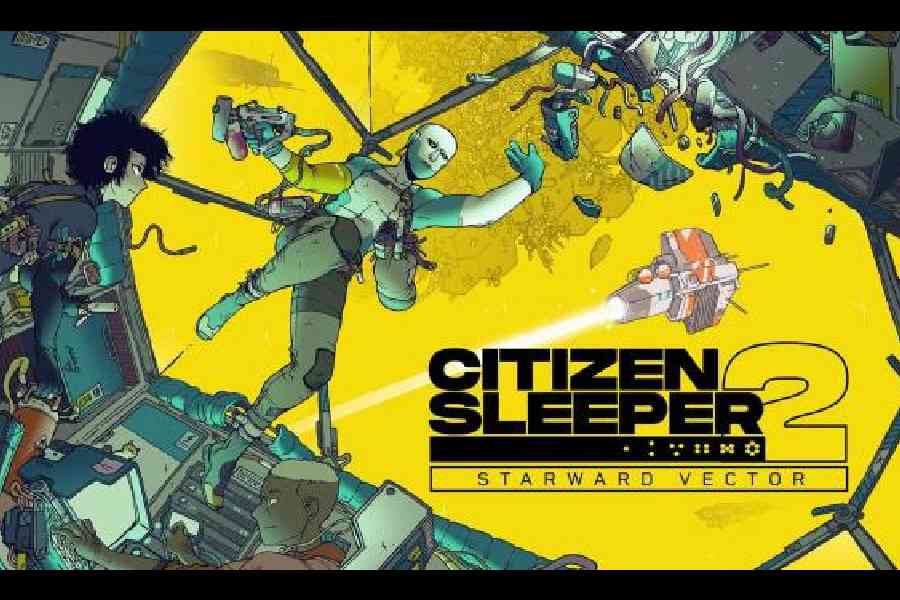The dice roll is the fundamental engine of numerous games. In a board game, it might determine what type of resources you receive or how far you move.
In tabletop role-playing games, it might determine whether an action is successful. When you swing your sword at an ogre, does it land a fatal blow? Or does your blade accidentally glance off a nearby statue and clatter uselessly to the ground? The dice decide.
Although video games often use similar systems to decide the outcome of a player’s actions, the dice roll itself — the machinery of chance — is typically concealed.
“The idea with video games is they’re supposed to be this warm bath of
immersion that you disappear into,” said Gareth Damian Martin, whose new game Citizen Sleeper 2: Starward Vector subverts convention by placing the dice centre stage.
The dice in Citizen Sleeper 2 can be spent on actions within a cyberpunk future where mercenaries, scavengers and outcasts eke out a hardscrabble living on the margins of a galaxy ruled by rival corporations.
The higher the number of an assigned die, the greater the chance that the player will successfully work shifts in an intergalactic kelp bar, sell scrap engine components down at the shipyards or overthrow a corporation as part of a labour revolution.
“The process of abstracting things to dice gives an incredible flexibility to storytelling,” said Damian Martin, who uses they/them pronouns. “The game inherently supports you and creates drama from any situation.”
Martin, feeling that it was time for role-playing games to evolve, realised that pulling back the curtain and revealing how the games work would not break the immersion.
“Video games have always had this slightly impoverished relationship with Dungeons & Dragons,” they said, “which means we’ve been re-creating the same game system in RPGs for decades.” This system remains popular: Baldur’s Gate 3, which also centres on dice rolls and recreates Dungeons & Dragons rather faithfully, is one of the most lauded video games of recent years.
Martin did not want to bring a fantasy theme or a complex rule book from the tabletop world to video games but rather the core idea that rules and mechanics can be an expressive tool for creating narrative and emotion.
Citizen Sleeper 2 casts the player as an emulated consciousness inside a synthetic body, created for the purposes of indentured labour. The game opens with you breaking free from the clutches of an icy gang boss and embarking upon a life on the run.
If your dice roll fails, you are not confronted with a “Game Over” screen or forced to start again. Instead, your story branches off in a different direction, the narrator rolling with the punch and recalibrating your course.
“Citizen Sleeper has the bravery to make things not work out sometimes,” said Cameron Kunzelman, a games academic and critic.
While similar in format to the first Citizen Sleeper, a surprise success that was released in 2022, the sequel adds more complex gameplay mechanics.
There are dice that accumulate stress and can break based on narrative events, as well as new contract missions — high-stakes operations that can (and often do) go spectacularly wrong.
Yet the game retains the engaging sci-fi storytelling, stylish prose and complex themes of the original.
It asks the player to make choices that are not simple questions of good and evil. Who do you trust? Whose needs take priority? Which sacrifice can you afford to live with?
Despite the brutal demands of simply surviving in these intergalactic shanty towns, players can still find salvation in community and offer small gestures of kindness to characters they meet along the way.
Beyond the flexible rules of tabletop role-playing games, Martin is inspired by the games’ potential for collaborative storytelling.
A group of people can build a narrative together, they said, while using dice to add surprise and provocation “like an improv comedian asking the crowd for suggestions”.
Martin said they hoped to turn the entire Citizen Sleeper franchise into a tabletop RPG eventually, allowing the game’s fans to tell their own stories within the universe.
“I’ve finished my monologue,” said Martin.











